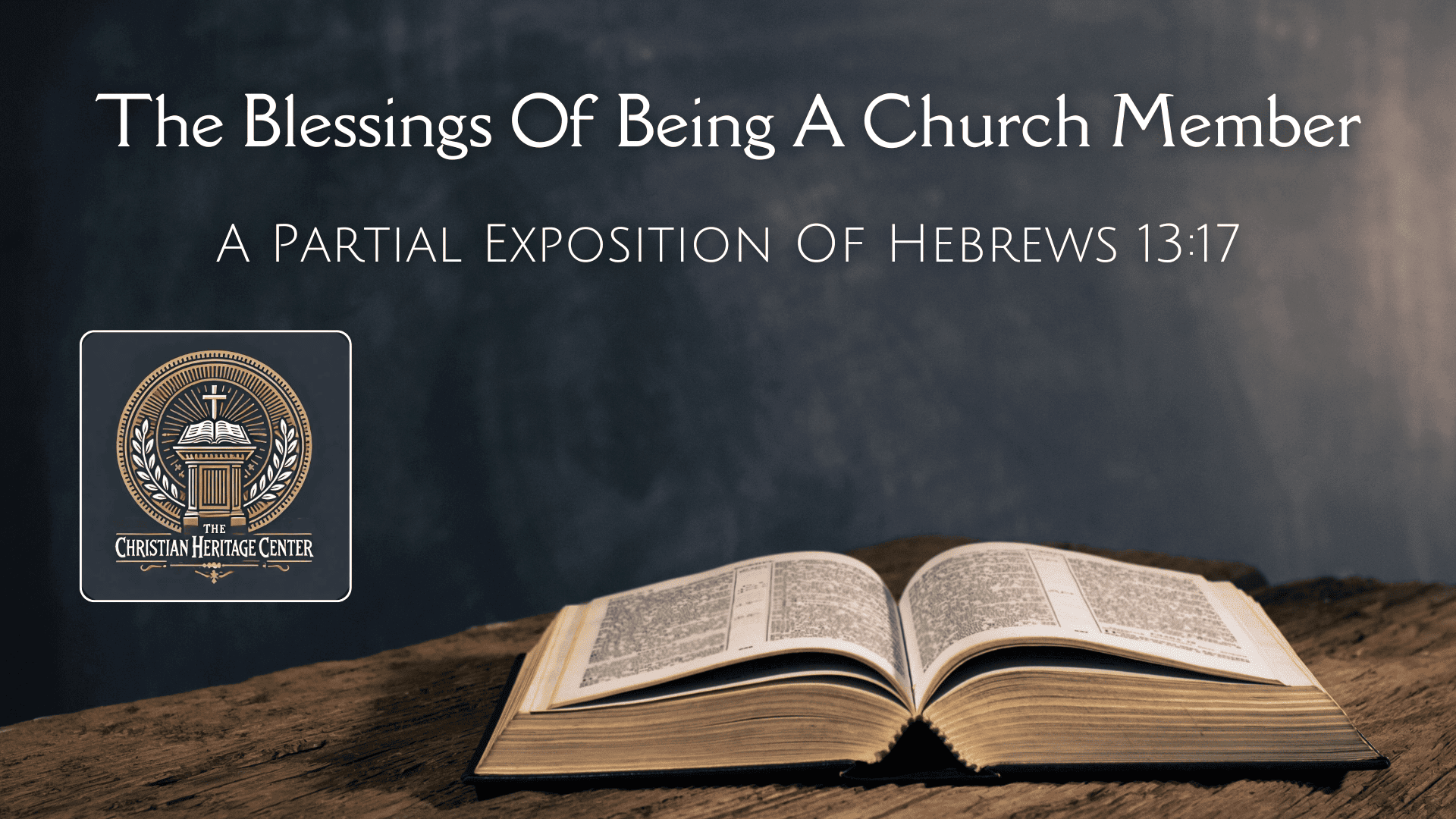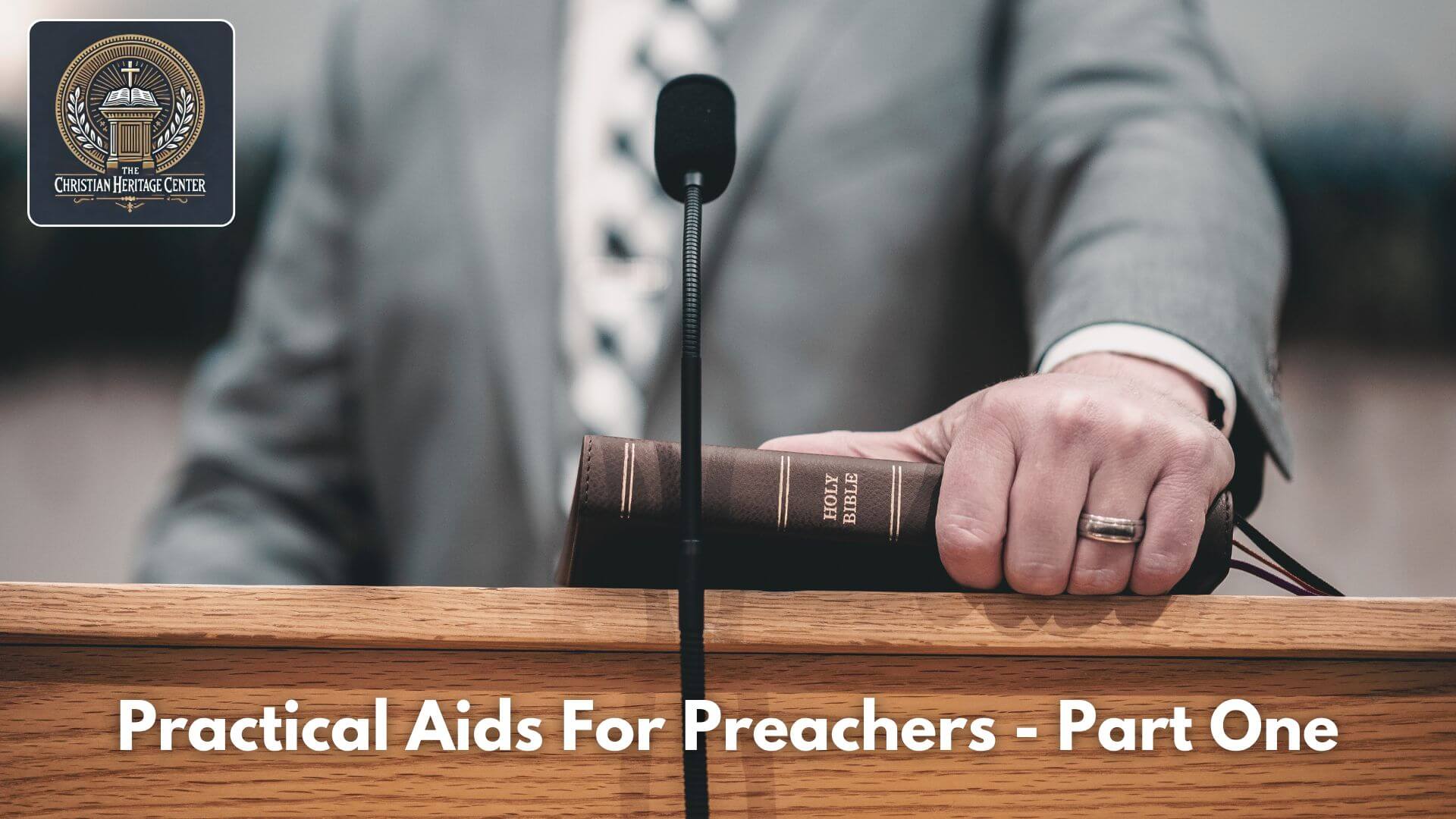17 Obey your leaders and submit to them, for they keep watch over your souls as those who will give an account. Let them do this with joy and not with grief, for this would be unprofitable for you.
I am pleased to write this partial exposition of Hebrews 13:17. This exposition concerns the blessings of being a church member, particularly the blessings that come from being the recipient of the pastoral ministry in a local church. There is a great deal of confusion associated with pastoral ministry and church membership. I reference these two together because an appropriate understanding of one helps in understanding the other, as well as the intimate relationship that exists between the two.
My emphasis in this partial exposition will show how church membership is the proper application of pastoral ministry but it will also show some of the distinct blessings which are designed to flow from pastoral ministry to members. I pray that God would use these humble means to help others in their understanding of these vitally important concepts.
I have named this “a partial exposition of Hebrews 13:17” simply because there is a great deal left in the text untouched. Later, I will write another “partial exposition” concerning the “The Duties of Pastors” from this same text.
Some Needed Nuances
When speaking of blessings associated with being a church member, I speak primarily of the benefits that members reap from pastoral ministry. Of course, there are additional blessings, privileges, and benefits associated with being a member of the local church, which I do not mention in this exposition. Many of these other blessings and privileges would vary based on the context and situation of different churches. Additionally, I do not speak of redemptive spiritual blessings (Eph 1:3), which sinners receive through the work of Christ. Pastors are not mediators of divine spiritual blessings; only Christ is. Nor do I speak of the blessings and benefits which come as the result of the general Christian ministry; I aim to focus on pastoral ministry and its recipients.
Hebrews 13:17 puts forward three distinct Blessings:
First, God provides church members with leaders.
The text states “Obey your leaders and submit to them…”. Normally, the New Testament uses the terms pastors, elders, or overseers. However, here it uses a distinct term to refer to the pastors as “leaders”. The text is alluding to a previous reference, which states, “Remember those who led you, who spoke to the word of God to you; and considering the result of their conduct, imitate their faith. (Heb 13:7).
Pastors are given to lead congregations. There is a great deal embedded in the meaning of the word “leaders”, but this text helps us understand how they are meant to be leaders of the people.
First, they are to lead the way in teaching the scriptures, or in speaking the scriptures to their people. They are meant to help church members be led into a greater understanding of God’s word and revelation. Pastors are to help lead their people through the revealed will of God.
Second, they are meant to lead by way of faith. Specifically, they are to have a faith that produces perseverance, godliness, holiness, and conduct worthy of imitation. Of all the people in the church, pastors ought to seek out a strong, nurtured faith that rests squarely on Jesus Christ.
Third, they are meant to be leaders through their conduct. The Hebrew Christians were experiencing a great deal of difficulty and problems because of their Christian faith. Their pastors were those who led the way through suffering and affliction. God gave pastors to show them godly conduct amid suffering. Not everyone is a leader, not all church members are capable of leading, however, pastors must be leaders, God has ordained it. Pastors are ordained to lead their people through this life and its problems. They are meant to guide members of their church through difficult decisions and painful situations. Most of all, pastors are meant to lead their members to God and Christ, to help them lift their eyes to heaven when they are weary of this world.
If you are a member of a local church, God has provided you with a leader through your pastor or elders. He has not provided this for the world, or for those who want to deride the church by scorning its membership. This God-given blessing is specifically for those under the oversight and watch care of pastors. Imitate them if their conduct is worthy of imitation. Learn from them. Reap the benefits and be led by those God has appointed to lead.

Second, God provides watch-care for the souls of church members.
The text reads “for they keep watch over your souls as those who will give an account.” When one considers this text and seeks to mine its depths for gold, one will find the nugget of truth that Jesus Christ cares for his church through pastors. This is so important to Jesus Christ that he holds pastors accountable specifically for this work. Every pastor will answer for every soul they have been given oversight or responsibility for.
The question naturally arises, who, then, is a pastor responsible for? Let me briefly answer negatively. Surely, it’s not every Christian everywhere? No, a pastor is not responsible for watching over the souls of every Christian. Then who? Is the pastor responsible for visitors and attendees? No, a pastor is not even responsible for watching over the souls of those who periodically attend or visit the cooperate worship of God.
Now, let me answer in the positive and very clearly. The pastor is held accountable for the souls of those who are members of his local church. Pastors have a holy obligation to a limited group of resident souls. In the high calling as a minister of the gospel of Jesus Christ, the minister will only answer for those allotted to them. This identifies the obligation of the pastor and the recipient of pastoral ministry.
Regarding pastoral oversight in general, Christians are not bound to submit to the leadership and authority of all pastors. There is a definite limitation to the extent of pastoral oversight, as well as a definite limitation to the scope of a Christian submission to pastors.
What is the nature of the limitation?
The limitation is the recognized authority-submission relationship, which has providentially been established at any given local church. In other words, the limitation is church membership, as it has been established in a local church. The text says, “they keep watch of your souls”, as well as “submit to them” or “your leaders”. The pastoral oversight in the text, identified with “Your souls,” and the submission identified with “your leaders” come together in a mutually established union of pastor and members.
Understanding the above relationship helps to explain how members derive blessings from pastoral ministry. Pastors are bound by their accountability to Christ to watch over the souls of their members. Christians become recipients of the watch care of pastors by and through becoming members of a local church. For example, members receive the ongoing prayers of their pastors; this is the unseen and unheard intercession that strengthens the members’ souls on difficult days.
Members receive pastoral care and love by way of phone calls and visits, which often include searching questions intended to examine the soul. Members are prayed for publicly in the cooperative worship of God. Members are counseled through the Word of God in times of need. Members alone are the blessed recipients of pastoral care. Though the worship of God is public, members are the primary recipients considered in the exposition and application of God’s word every Lord’s Day, not visitors or the unregenerate. Members are the unique, distinct, and singular recipients of pastoral care.
The text expands on the role of a pastor, in addition to them being leaders. It likens the duty of pastors to that of the Old Testament (OT) watchmen. It states, “for they keep watch over your souls…”. The OT speaks a great deal about watchmen. They were responsible for watching out for benevolent and ill-willed approaching parties; they guarded the towns and cities of Israel by watching, spying, and looking for threats (2 Kings 9:17). They were responsible for proclaiming warnings (Ezekiel 33:7) and exhortations to the people. They were specifically appointed for Israel, the people of God (Ezekiel 33:17), to be guardians and protectors of God’s covenant community.
This text teaches that, for the most part, the pastoral ministry has to do with watching over, caring for, and ministering to the souls of members of God’s new covenant community. God has uniquely fitted and gifted the church with pastors as watchmen of the soul. This means the primary blessings and benefits derived from pastoral ministry in the local church are spiritual and are associated with appointed watchmen. God has so designed the church that he ministers to his people’s never-dying souls through the work and labor of local pastors. These blessings are only conveyed in the context of church membership. The unregenerate and non-members have secular help and worldly assistance available to them. The watchmen are given for the care, nurture, and protection of the covenant community.

Third, God intends for church members to profit spiritually from the pastoral ministry.
The last line of our text reads “Let them do this with joy and not with grief, for this would be unprofitable for you.” The scripture is exhorting the Hebrew Christians to submit, obey, and be ministered to in such a way that allows for joy in the life of their pastors. The author knows the manner or fashion in which church members submit to pastoral leadership is impactful and meaningful.
The text speaks of four results that may proceed from godly or ungodly submission to pastoral care.
First, it speaks of submission, which allows for joy in the pastor’s life. This is a godly and appropriate submission that does not make a pastor’s duty toward the member an affliction or strip him of joyful satisfaction in the work. This is a good submission. This is a submission that receives the Word of God gladly and accepts exhortation and correction. This is a submission that emulates a pastor’s faith and life amid persecution or affliction. This is a submission that asks, How do I need to act, worship, participate, serve, or attend in such a way as to produce joy in the life of my pastors whom Christ has appointed?
Second, it speaks of the spiritual profit of the members. It reads “this would be unprofitable for you,” explaining how wrong submission results in an unprofitable outcome for the members. Remember, the author is exhorting the Hebrews to submit profitably. Therefore, this is directly related to good submission, which produces joy in the life of pastors. Members are meant to receive the benefits and blessings of pastoral care because it is profitable to their souls and their Christian lives.
There is an advantage to the reception of pastoral ministry in the life of the believer. Members profit from rightly submitting to pastors, and pastors profit in joy from members rightly submitting. Oh, what a blessed union the Lord has designed! The Lord has designed and intended the pastoral ministry to produce and bring about spiritual profit in the lives of church members.
Third, it speaks of submission, which can potentially produce grief in the pastor’s soul-care duties. There is a way that members conduct themselves under the ministry that causes grief for those ministering. This is not godly submission. This could be anything from a quarrelsome spirit to disorderly conduct in the worship of God. Some receive the ministry of pastors in such a way that it is grief-inducing.
Fourth, we find grief-inducing members receive no profit from the pastoral ministry. It’s important to notice that the lack of profit or advantage is not the result of the absence of pastoral ministry in this text. It most likely speaks of the reality that some outwardly receive pastoral ministry, yet they never reap the benefits of it because of their attitudes toward it and their hearts’ reception of it.
It’s important to remember that the author says, “Let them do this with joy…” This is a scriptural exhortation to submission in a godly fashion. We can deduce the intent of the author from this exhortation. If the author is making his desire known through the exhortation that the Hebrew Christians are to submit to their leaders in a fashion that allows for joyful administration of the pastoral ministry, then we must conclude it is also the author’s intent for the Hebrew Christians to be profited by that pastoral ministry. Good submission leads to a profitable reception of the ministry. This is what the author is saying. The author wants church members to profit and receive great spiritual benefit, help, and edification from the pastoral ministry.

Summary
In summary, we can see that there are distinct blessings associated with church membership. These blessings flow from pastoral ministry to the member who is under that ministry. In this brief exposition, we have made note of three distinct blessings.
- God has blessed the church members with leaders.
- God has provided watch care for the souls of church members.
- God intends for church members to be profited through pastoral ministry.
Conclusions
We must draw certain conclusions from this brief exposition of the Word of God.
Let me provide three:
First, we must conclude the nature of these blessings. The blessings spoken of in this text are the benefits derived directly from pastors ministering to their members. The Pastor is primarily called to watch over souls, or the spirit, as it is referenced elsewhere. Pastoral ministry is spiritual work. Pastors are called to watch over, nurture, and care for the souls of their people. It is particularly through instruction in and application of the Word of God that pastors do this. This is why Hebrews 13:7 says, “remember those…who spoke the word of God to you…”, focusing on the instruction of the appointed leaders.
With a basic understanding that pastoral work is soul-care and spiritual work, we must conclude that the blessing derived will follow suit. We could say the pastor sows seeds of ministry in the spiritual lives of his members, and that those seeds are reaped in the form of spiritual profit. What is the nature of the seeds? It’s instruction in the Word of God and prayer that is planted. True pastoral ministry is always centered upon these two elements, regardless of the context and setting in which they are administered.
The pastor’s purpose is the Ministry of the Word, its preaching, teaching, exhorting, rebuking, correcting, training, and equipping, by and through the Word. This can be done in the public worship of God, or a private setting of counsel and comfort; however, the ministry remains the same, instruction and application in the Word. It is through the Word that pastors warn God’s covenant community of dangers and impending threats. They act as watchmen in that they warn of the world, the flesh, and the devil.
As pastors minister the Word of God in various settings, they must make sure that it is accompanied by prayer and intercession. Praying for their members to understand the will of God and have discernment concerning the teaching of the bible. They must pray for members to be built up and strengthened. They must pray for the comfort and assistance of their members. Through prayer, pastors help guard and protect the souls of members from the dangers of sin, false doctrine, and immoral living.
These two great ministerial duties bless the souls of church members in ways that are indescribable and incalculable. These two duties are given that members of the church might be spiritually profited by and through them, that they might have their never-dying souls cared for.
Brothers and sisters, when speaking of the church of Jesus Christ and the blessing therein, we are not talking about country club membership and social privileges. We are talking about blessings aimed at the eternal souls of God’s people. Oh, Christian, that all of God’s people would be the subject of such a ministry! How detrimental and what a loss to the soul of a man or woman, that they would deny their souls such care!
Second, we must conclude the relationship these blessings are experienced. The text of this exposition speaks of a formal authority-submission relationship. It speaks of obedience, submission, authority, accountability, and leaders. All these terms have to do with a formalized and recognized relationship. It speaks of a group that willingly submits to the authority of leaders, and it speaks of leaders exercising authority. It is in the context of this relationship, and this relationship alone, that the blessings spoken of are conveyed. This relationship limits the scope of pastoral ministry to those who willingly submit and receive their ministry, and it limits the extent of the submission exercised by those under their leadership.
What should we call this relationship? Historically, it has been called church membership. This is the formal authority-submission relationship recognized in the text. Members are those who willingly submit to the teaching, authority, and expectations of pastoral ministry as it is administered in the context of the local church. Church membership, then, is where the blessings spoken of are experienced. They are limited to the membership of the local church. Those who are members of a healthy local church are profited, ministered to, and blessed in a way that others outside church membership are not.
Third, we must conclude the universal intent of church membership. The Word of God is relevant; it is given to the church throughout the ages. Its promises transcend time, and its commands continue through the generations. All of scripture for all of life, and for all Christians.
As scripture, Hebrews 13:17 is relevant for all Christians; it expects obedience from all believers. The Spirit of God inspired the author to write, “Obey your leaders and submit to them,” with the intent of Christians being obedient to this command. With an understanding of the previous conclusion regarding the recognized authority-submission relationship, we can now conclude that God intends for this relationship to be relevant for all Christians, for all time.
Church membership is intended to be universal in the life of Christians because Scripture is given to all believers. If God expects obedience to scriptural commands, then he expects obedience to Hebrews 13:17. If he expects obedience in the context of the relationship in Hebrews 13:17, then he expects church membership to be universal in the life of Christians.
Christian, for you to be obedient to Hebrews 13:17, you must be in submission to the authority of a pastor. If not, then who? How will you be obedient to Hebrews 13:17 if it’s not in the context of church membership? How are you to be led? How are you to be ministered to? How are you, Christian, to receive profit? Who will account for your soul, if not particular pastors?
This exposition is not intended as an argument for church membership. It is meant to demonstrate the blessedness of church membership concerning pastoral ministry. Brothers and sisters, if you are in sweet and godly submission to the ministry of a healthy local church and its pastors, you are right where the Lord Jesus Christ wants you. You are the recipient of the distinct blessings spoken of in this exposition! Be encouraged and be faithful! Be blessed and enjoy the great benefits conveyed through the pastoral ministry!



